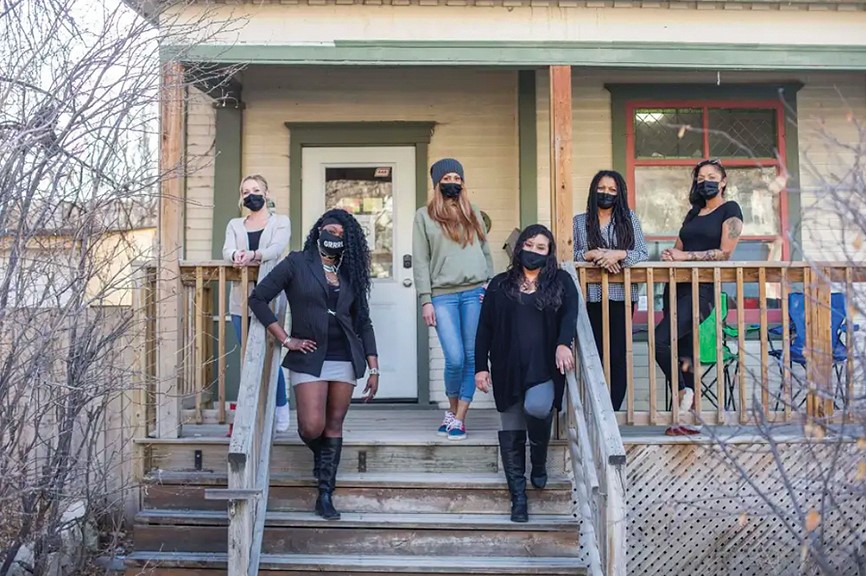Seeking solace at Velma’s House: a 24/7 safe space
Advertisement
Read this article for free:
or
Already have an account? Log in here »
To continue reading, please subscribe:
Monthly Digital Subscription
$0 for the first 4 weeks*
- Enjoy unlimited reading on winnipegfreepress.com
- Read the E-Edition, our digital replica newspaper
- Access News Break, our award-winning app
- Play interactive puzzles
*No charge for 4 weeks then price increases to the regular rate of $19.00 plus GST every four weeks. Offer available to new and qualified returning subscribers only. Cancel any time.
Monthly Digital Subscription
$4.75/week*
- Enjoy unlimited reading on winnipegfreepress.com
- Read the E-Edition, our digital replica newspaper
- Access News Break, our award-winning app
- Play interactive puzzles
*Billed as $19 plus GST every four weeks. Cancel any time.
To continue reading, please subscribe:
Add Free Press access to your Brandon Sun subscription for only an additional
$1 for the first 4 weeks*
*Your next subscription payment will increase by $1.00 and you will be charged $16.99 plus GST for four weeks. After four weeks, your payment will increase to $23.99 plus GST every four weeks.
Read unlimited articles for free today:
or
Already have an account? Log in here »
Hey there, time traveller!
This article was published 21/12/2022 (1082 days ago), so information in it may no longer be current.

Imagine moving from place to place with all your belongings, unsure of where your next meal will come from or where you can sleep, questioning whether any situation or person you encounter is safe, numbing yourself to deal with the uncertainty and despair. This is the daily reality for many people living on the street. It was the life C.H. was living, supporting herself through sex work, when she started coming to Velma’s House on Sherbrook Street.
C.H. had trouble renting due a history of evictions, unaddressed mental health and addiction issues. She didn’t even have a phone, so it was tough to keep appointments with anyone who could help. C.H. says she began seeking solace at Velma’s because of the welcoming environment, emotional support from staff and the patience, encouragement, understanding and love that they show women.
“Other safe spaces or shelters are co-ed, which isn’t always a truly safe option for women, they feel safe here and welcomed in a space where the staff look like them and understand them.”
Velma’s House, a Ka Ni Kanichichk initiative, is the first 24/7, indigenous-led, low barrier safe space in Winnipeg specifically for women and gender diverse folks, funded in part by United Way Winnipeg. The space is named after Velma Orvis, an advocate in the Missing and Murdered Indigenous Women, Girls, and Two-Spirit epidemic. Low barrier in this instance means that being sober is not a requirement for assistance. Women and members of the 2SLGBTQ+ community can visit Velma’s House on a drop-in basis, without the need for an appointment.
“Other safe spaces or shelters are co-ed, which isn’t always a truly safe option for women, they feel safe here and welcomed in a space where the staff look like them and understand them,” explains Candace Abdilla, Program Coordinator at Velma’s House. “A lot of our participants have been sexually exploited; we provide a welcoming environment, free of shame to ensure our participants are comfortable while they warm up and seek safety.” Many of the staff have lived experience, have been impacted by colonialism, racism, poverty, substance use and sexual exploitation themselves.
“When participants come through our doors they are treated like family; we have big auntie laughs, we cry together, we hug and we tell each other we love each other.”
Velma’s House provides access to traditional medicines, Elders, ceremony, and cultural ways of healing. Hot meals, a safe place to rest, warm up or cool down, emergency clothing, hygiene and harm reduction supplies, laundry, and shower facilities are also available. Many participants face hurdles such as lacking ID, a bank account, or a home address, and require support navigating access to housing, Employment and Income Assistance and/or Child and Family Services.
“At Ka Ni Kanichihk, we lead with our hearts and know that those are our relatives coming through the door” says Abdilla. “When participants come through our doors they are treated like family; we have big auntie laughs, we cry together, we hug and we tell each other we love each other.” Although Velma’s House is a new program, the demand is clear: they have had over 7,000 visits in 2022 so far.
Thanks to Velma’s House C.H. went to detox, then rehab, has begun the work of addressing her mental health and is currently in second stage housing. She is now a part of the Advisory Committee and volunteers twice weekly at Velma’s House. She is working towards starting the Social Innovation and Community Development (SICD) program through Ka Ni Kanichihk next year. SICD is an educational and work experience program delivered in partnership with the Centre for Aboriginal Human Resources (Neeginan Institute of Technology) that prepares Indigenous women for a career in community development and provides graduates with accreditation from Red River Polytechnic.
Velma’s House will be moving into a significantly larger and more accessible space in the near future, allowing them to help three times as many participants over the next four years. For many, it will be the lifeline that lets them begin to heal, overcome trauma and addiction, and break the cycle of poverty.

